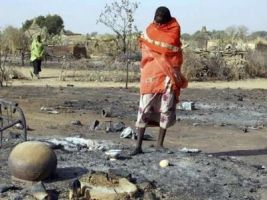Sudanese army responsible of atrocities against Darfur civilians
March 20, 2008 (GENEVA) – Sudanese army committed deliberated acts of violence against civilians in western Darfur during January and February 2008, a UN report said today. It further added that the failure distinguish civilians amounting to violations of international humanitarian and human rights law.
 A report issued jointly on Thursday by the UN High Commissioner for Human Rights (OHCHR) and the United Nations–African Union Mission in Darfur (UNAMID), stated that recent attacks by militias and the Sudanese Armed Forces on four villages in West Darfur, that left at least 115 people dead and some 30,000 displaced, amount to violations of international humanitarian and human rights law.
A report issued jointly on Thursday by the UN High Commissioner for Human Rights (OHCHR) and the United Nations–African Union Mission in Darfur (UNAMID), stated that recent attacks by militias and the Sudanese Armed Forces on four villages in West Darfur, that left at least 115 people dead and some 30,000 displaced, amount to violations of international humanitarian and human rights law.
The attacks on Saraf Jidad took place on three separate occasions in January, while those on the villages of Sirba, Silea and Abu Suruj occurred within a few hours of each other on 8 February. They were carried out during a major military push by the Sudanese government to regain control of West Darfur’s northern corridor, and drive out an insurgent group, the Justice and Equality Movement (JEM). All four villages are located some 50-70 kilometres north of El Geneina.
Rebel JEM activities prior to the Government’s military offensive, including a 29 December attack on Government positions in Silea and its public statements justifying the use of force, have been determined separately by the Darfur Ceasefire Commission to be in violation of the 2004 N’Djamena Ceasefire Agreement.
The 8 February attacks in Sirba, Silea and Abu Suruj involved aerial bombardments by helicopter gunships and fixed-wing aircraft, accompanied by ground offensives by armed militia on horses and camels, and by the Sudanese Armed Forces.
According to the report, information gathered by UNAMID Human Rights Officers indicates that “these actions violated the principle of distinction stated in international humanitarian law, failing to distinguish between civilian objects and military objectives.
Moreover, the scale of destruction of civilian property, including objects indispensable for the survival of the civilian population, suggests that the damage was a deliberate and integral part of a military strategy.”
The report also describes extensive looting during and after the attacks, and catalogues “consistent and credible accounts of rape committed by armed uniformed men during and after the attack in Sirba.”
As a result of the attacks, the report says, at least 115 people were killed, including elderly and disabled people, women and children. In addition, more than 30,000 individuals were forcibly displaced to other locations, including across the border into neighboring Chad. Civilian homes, NGO clinics and offices, community centers, water structures, schools, food storages, milling machines and shops were systematically looted, vandalized and in many cases burned to the ground – sometimes with their occupants still inside.
UNAMID Human Rights staff were unable to investigate reports that similar ground and air offensives carried out on Jebel Moon and nearby areas, such as Goz Minu and Aro Sharow on 18, 19 and 22 February 2008 also resulted in the killing of civilians, as the Government denied the UN access to Jebel Moon until 1 March 2008.
According to the report, this was “in breach of its obligation to allow UNAMID officials freedom of movement under the Status of Forces Agreement signed between the UN and the Sudanese Government in February 2008.”
(ST)
